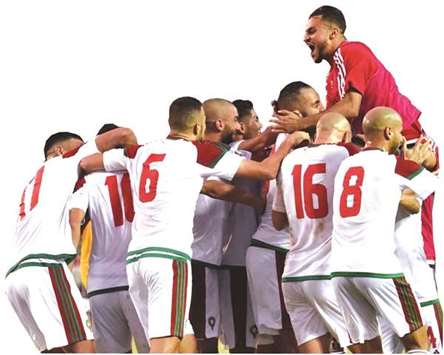
“It was of the law of football. You just have to accept it,” insists the former Coventry and Aston Villa midfielder. “I played in front of all my friends and family so it was a special time. Everyone was waiting for Morocco to make it through to the second round but sometimes that’s just the way it is. Maybe if we got through we would have been beaten badly and people would have forgotten all about it. But we played some very good football and that will always stay in the hearts of the Moroccan people.”
Despite Hadji’s brilliant solo goal in the 2-2 draw with Norway and a 3-0 victory over Scotland in Saint-Étienne in their final match, the Atlas Lions were denied the chance to follow the class of 1986 into the knockout stage after Kjetil Rekdal’s 89th-minute penalty against Brazil in Marseille.
Two decades on, Morocco have got the opportunity to make it to the World Cup for the first time since then when they beat Ivory Coast 2-0 in Abidjan on Saturday. A spectacular transformation in fortunes under the former Ivory Coast manager Hervé Renard, who in 2015 became the first man to win Africa Cup of Nations titles with different countries, has transformed a team that had struggled to live up to the exploits of previous generations and missed out on hosting Africa’s premier competition that year after pulling out because of the Ebola epidemic.
With Hadji as his assistant, the former Cambridge United manager has led Morocco to the top of Group C after six matches.
“He has done a really great job,” says Hadji. “You can see the atmosphere in the team – there is passion among the players and we have brought in a more professional approach. The spirit is superb and that has made a big difference. Sometimes just having quality isn’t enough.”
Bolstered by a number of players with Moroccan heritage who were born overseas including the captain, Medhi Benatia of Juventus, the Southampton forward Sofiane Boufal, the Galatasaray playmaker Younès Belhanda and the rising star Achraf Hakimi of Real Madrid, Renard’s side followed up a first quarter-final appearance at the Cup of Nations since 2004 earlier this year with home victories over Mali and Gabon to put themselves in pole position for a place in Russia next summer. Hadji, who represented France at Under-21 level having moved to Alsace-Lorraine as a child, believes they are reaping the benefits of the squad’s varied upbringings.
“I was probably the first player to choose Morocco and it comes down to what is in your heart,” he says. “It’s not about money or anything else – you play for your own country and represent all your family. I’m really happy with the choice I made and to be able to help the current generation.
“When you have players like them coming to play for their own country it makes a big difference. We have been able to mix together the best of the players from overseas and those who grew up in Morocco.”
The appointment of the former government finance minister Fouzi Lekjaa as president of the Moroccan FA in 2013 also proved to be a turning point. Lekjaa has ensured that the success of the country’s thriving domestic league – WAC Casablanca beat Al Ahly in the final of the African Champions League last weekend – has been translated to the national side, with King Mohammed VI also attempting to fulfil his late father Hassan II’s long-term ambition to host the World Cup in 2026 – the fifth time they have bid for the tournament having just missed out to South Africa in 2010. Hadji is in no doubt what qualifying for next year’s edition could do for his country.
He says. “Morocco loves the game and is a real football country. It’s the first time we have qualified since the king came to the throne. It is the biggest gift we can give if we make it. The Moroccan people have been waiting for this for a long time – rich people, poor people, the guy on top of a mountain with his sheep.”

